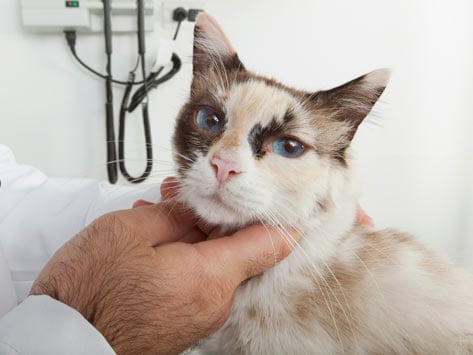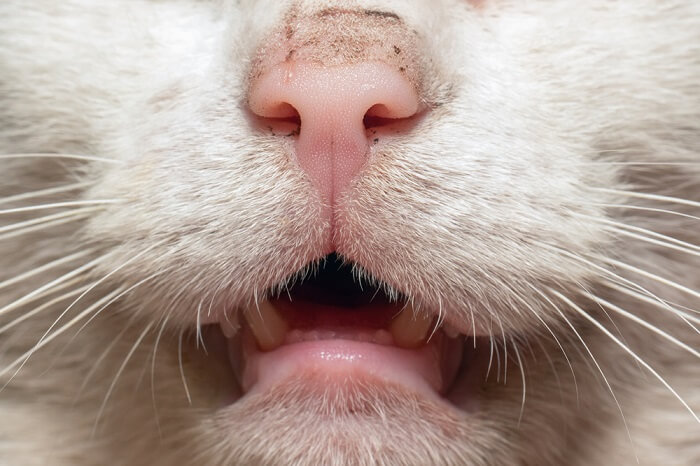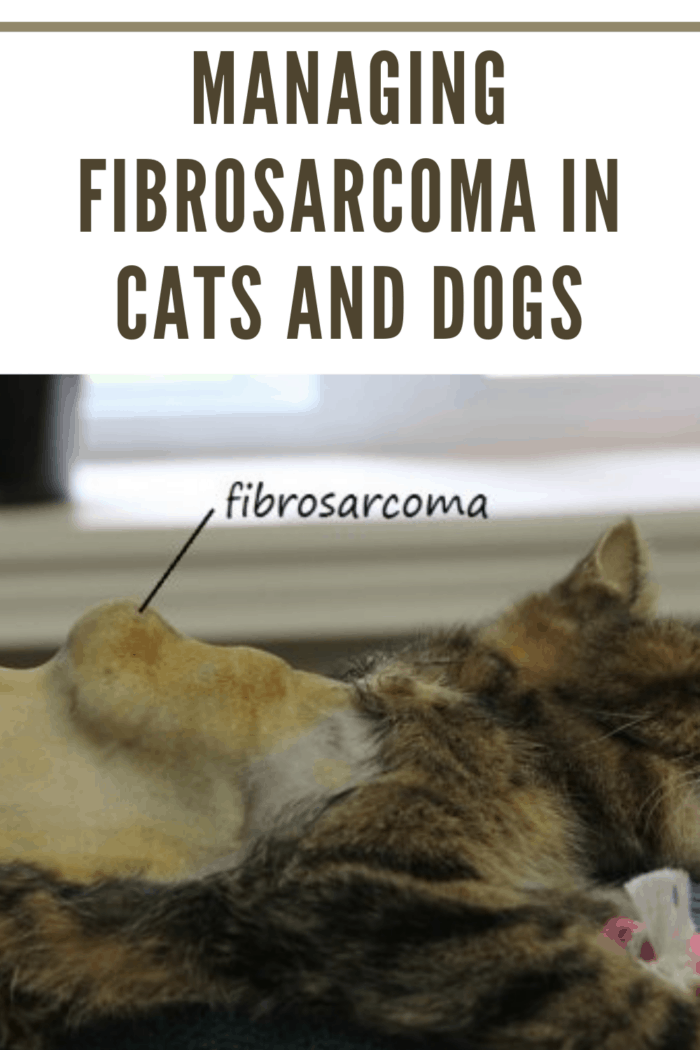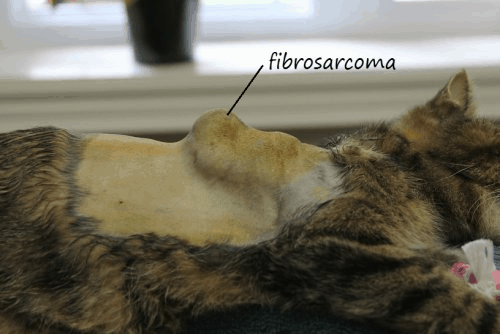fibrosarcoma in cats mouth
There are some that are less invasive. There is no breed or sex predilection.

Common Oral Tumors In Cats And Dogs Vet In Aurora The Animal Dental Clinic
Gender appears to play some role with male cats being seen for gingival tumors more often that female cats.

. It is a mass that usually occurs in the skin of a cat at the site of an injection or vaccination. 75 of all oral tumors in cats are squamous cell carcinoma. Fibrosarcoma is a locally aggressive cancer of the soft tissues typically skin that is relatively common in cats.
These tumors are very invasive locally meaning they invade the adjacent tissues which can make management difficult. An oral tumor is an abnormal growth of cells. In addition to declining appetiteespecially for hard foodthe signs that an oral cavity tumor is present may include drooling difficulty in.
These tumors may spread to the underlying bone causing pain. At a younger age with a median of 73 to 86 years. All of which can become cancerous eg skin cells bone cells fibrous cells.
These tumors most commonly originate in the gums. So what causes the initial growth in the first place. In rare cases though the cancer can be found.
Squamous cell carcinoma is the most common oral tumor in cats. Oral fibrosarcoma is the second most common oral tumor in cats and the third most common in dogs. These begin with a solid mass that increases in size over time.
Surpassed in frequency of occurrence only by lymphoma skin cancer and mammary cancer oral cavity cancer accounts for about 15 percent to 20 percent of feline malignancies seen each year at the Cornell University Hospital for Animals. Fibrosarcomas also known as fibroblastic sarcomas are malignant tumors derived from the fibrous connective tissue. They are the most common type of soft-tissue sarcoma tumors in cats and are also frequently observed in dogs.
Not all of these tumors are cancerous. It originates in the fibrous connective tissue and is the most common soft tissue tumour to affect cats. There are cases in which these are quite aggressive with a great degree of invasion spreading to other tissues quickly.
Fibrosarcoma occurs more commonly in young dogs. These tumors arise from the connective and fibrous tissues of the oral cavity. The vet said we should send him to a specialist and have half his jaw removed.
Possible Causes of Fibrosarcoma in Cats With cat tumors it can be challenging to pinpoint the root cause. What is a fibrosarcoma. The lump will be firm and attached to the surrounding area and it will be hard to feel the edges.
There are three causes of fibrosarcoma. At its core this type of skin cancer tumor arises when cancerous cells begin to grow rapidly and eventually outnumber the healthy cells. Have difficulty eating Lose its appetite Become dehydrated Painful walking Become lethargic Develop mysterious bleeding in its mouth.
The cause has not been established although. Fibrosarcoma in dogs is often found in the mouth particularly the jaw and on the limbs. Oral fibrosarcomas are the second most common malignant oral tumor in cats.
Oral fibrosarcomas are the second most common mouth tumors in cats Oral fibrosarcomas are the second most common mouth tumors in cats but they still only represent approximately one in ten oral tumors. Treatment involves surgical removal of the tumors and radiation treatment may be considered if surgery is incomplete. They are locally invasive however spreading is uncommon.
Oral tumors in cats are rarely benign. Some tumors may grow slowly and do not typically spread called benign while others will act aggressively called malignant. There are several different types of tumors that can develop in the mouth of a cat.
Fibrosarcoma in cats is often found between the shoulder blades on the back of the neck and on the chest. A cats mouth similar to our own is made up of several different cell types. Lethargy or lack of energy Weight loss and loss of appetite.
Approximately 70 of oral tumors in cats are squamous cell carcinomas. And with a possible male predisposition. 1318-2154 In dogs oral fibrosarcoma tends to occur in large breed dogs particularly golden and Labrador retrievers.
They arise as masses in the mouth more commonly than in the legs. Fibrosarcomas are the second most common oral tumor in cats. A fibrosarcoma FSA is an aggressive type of malignant growth cancer that consists of fibroblasts.
Advanced fibrosarcoma causes the cat to. This type of cancer originates in fibroblasts or in connective tissues it is generally subcutaneous that is it occurs under the skin. Oral squamous cell carcinomas may appear in the mouth and on the tongue of cats and are not caused by sun damage.
1 Because of this fibrosarcomas are also referred to as injection site sarcomas or. Most fibrosarcomas form in the skin subcutaneous tissue the layer underneath the skin or oral cavity mouth. Oral masses in cats may be caused by inflammation infection or even trauma.
The average age of affected cats is 13 years but they may occur as early as one year of age. A fibrosarcoma is a type of cancerous tumor that occasionally occurs in cats. Fibrosarcomas are common in older cats.
These tumors arise from the fibrous and connective tissues of the oral cavity. The most common location for a fibrosarcoma of the the mouth is in the gums gingiva. The grooming habits of cats expose them to carcinogens such as cigarette smoke and flea collars which increase their risk of developing these squamous cell carcinomas.
Oral fibrosarcoma will often look surprisingly benign. Cats that are afflicted with gingival fibrosarcomas are on average seven and a half years old but these tumors have been seen in cats from the age of six months to fifteen years. Eventually as the cancer progresses cats with fibrosarcomas will develop these symptoms.
The most common oral cancer in the cat by far is squamous cell carcinoma. Up to 10 cash back Fibrosarcoma is a cancer that appears in the skin and soft connective tissues of both cats and dogs. Most oral squamous cell carcinomas are single ulcerated lesions.
Oral tumors in cats. In rare cases though the cancer can be found in the bones of both animals.

Mouth Cancer Gingiva Fibrosarcoma In Cats Petmd

Can Cats Eat Tuna Is Tuna Safe For Cats Cattime Cats Cat Facts Ragdoll Cat

Feline Fibrosarcoma Bluepearl Pet Hospital
Oral Tumors In A Cat In Southwest Florida

Mouth Cancer In Cats Causes Symptoms Treatment All About Cats

Managing Fibrosarcoma In Cats And Dogs Mommy S Memorandum


